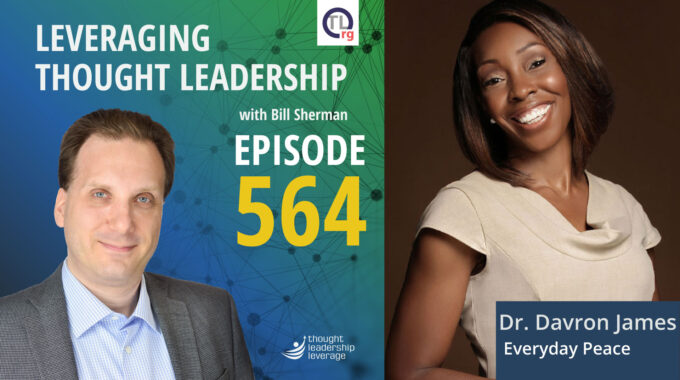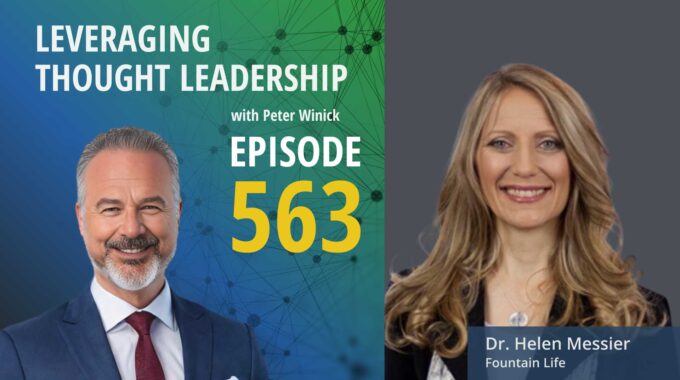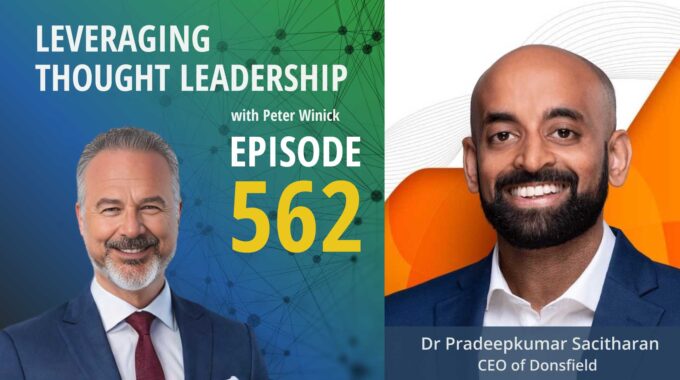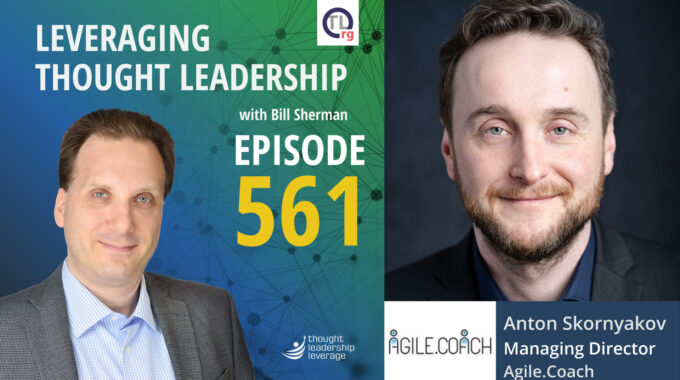Embracing Self-Awareness for Personal Growth and Peace A conversation with Dr. Davron James about her…
Culture in Marketing | Marcus Collins
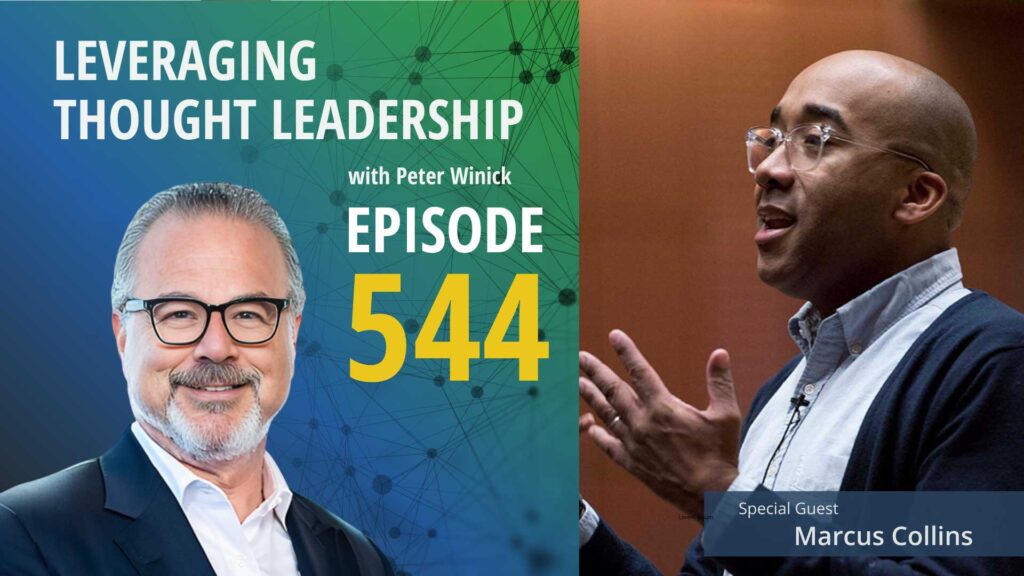
Making visible the invisible forces that drive our habits.
An interview with Marcus Collins about merging academia and practitioners in marketing.
Why do we do what we do and buy what we buy?
What invisible forces drive those actions – and how can they be seen?
Today our guest is Marcus Collins an award-winning marketer and culture translator. He is a Clinical Assistant Professor of Marketing at the Ross School of Business and an award-winning author. His newest book is For the Culture: The Power Behind What We Buy, What We Do, and Who We Want to Be.
Marcus shares how there is no greater external force more influential to human behavior than culture! However, if you ask ten people what culture is you’ll get a different answer each time. Marcus explains that you must understand who you are, how you see the world, and what you believe if you are going to create a coherent and positive culture.
Marcus’s first solo book For the Culture: The Power Behind What We Buy, What We Do, and Who We Want to Be came from his exploration of social sciences to understand better who we are as people and what the underlying physics of why we take the actions we do. Marcus states that as a marketer we have to gain that understanding to get others to adopt the behavior we are promoting.
While launching the book Marcus chose to eat his own dog food, taking the same approach to his book launch as he would launch a client’s product. Building out from understanding the culture the book represents he reached out to former students who embraced the thinking he taught, enlisting them to boost the signal of the book on launch day. By doing this he created a following of true believers willing to evangelize his book and ideas!
Marcus shares smart advice for anyone who feels their culture is lacking clarity or for those who struggle to truly connect to their target audience.
Three Key Takeaways:
- There is no external force more influential to human behavior than culture.
- It’s about getting your thinking in the hands and minds of more people.
- If you can activate people with shared convictions, then those people will evangelize on your behalf.
If you need a strategy to bring your thought leadership to market, Thought Leadership Leverage can assist you! Contact us for more information. In addition, we can help you implement marketing, research, and sales. Let us help you so you can devote yourself to what you do best.

Transcript
Peter Winick And welcome, welcome, welcome. This is Peter Winick. I’m the founder and CEO at Thought Leadership Leverage. And you’re joining us on the podcast, which is leveraging thought leadership. I’m really excited about today’s episode. I’ve got Marcus Collins here. He’s an award-winning marketer and culture translator with one foot in the world of practice. He’s the chief strategy officer at Widening Kennedy small little agency. And then he’s also a marketing profit, the Ross School of Business at the University of Michigan. He’s got a couple books out. We’ve got a new one. And before getting into all of the minutia of his buy, I’d rather just talk to him because he’s quite unique. So welcome aboard, Marcus.
Marcus Collins Thanks for having me, Peter. Good to be here.
Peter Winick And I will just mention, although this will be dated is we’re recording this the day after that team in Michigan won some sort of a football game. So there’s a little bit of gloat going on here. Uh, because Marcus is also a Detroit native.
Marcus Collins So, we call it zeal.
Peter Winick Zeal. Oh, there we go. They call a deal and the market. Okay, so let’s start with give us the short version of your backstory. Because what I always find from a thought leadership perspective is you’ve got, you know, one camp of academics and one camp of practitioners and never the twain shall meet. But you’ve met so indeed.
Marcus Collins So I consider my career is really about bridging the academic practitioner gap. I spend a majority of my time on the practicing side, uh, working in marketing and advertising. I’m from Detroit, born and raised. You know, I start that way because I feel like I’m a product of the city, went to go study engineering, realized I didn’t want to be an engineer, end up writing love songs for a living, much to my parent’s chagrin, when that was cool.
Peter Winick As do most engineers.
Marcus Collins So we do. We do
Peter Winick Yeah. That’s right.
Marcus Collins Right now, going back to school to get my MBA, worked at Apple, moved to New York, ran digital strategy for Beyonce, and then really found a home in the world, in the world of advertising. And along the way, I started to explore the social scientists. I could understand who we are as a species people, and what are the underlying physics that govern what we do as marketer. That’s very compelling because our job is to get people to adopt behavior. So understanding why people do what they do and the invisible forces that swayed them became really compelling for me. And in that, in that pursuit, not only did I start learning more about us, though, my work got tremendously better, like infinitely better. And I said, oh, that’s the that’s the cheat code. Understanding the theory, understanding the academic side and applying it to to the practice. Somebody got a doctorate and not like to make it, you know, like I just went got one. But I pursued it.
Peter Winick When you say I went on and got a doctorate like it was a weekend, a course at, you know, whatever.
Marcus Collins So I pursued, uh, doctoral degree at, at Temple University. And now I sit in the world of academia firmly as a full time professor at the School of Business, University of Michigan, most recently at wine Kennedy and I use my, you know, my experience as a practitioner and my understanding as an academic to help brands, people, institutions, organizations, entities, politician, activists. I help them get people to move. But that’s really what the crux of my work is. How do we get people to move? By understanding the cultural subscription to which they subscribe, that ultimately governs how they show up in the world.
Peter Winick Got it. And you and you’re still doing obviously, even though you’re your full time professor at Ross, advisory work, consulting work, etc. there. So it’s not like you’re only academic.
Marcus Collins I’ll never only be an academic, they’ll never only be a practitioner, it’s the the bridging of the two. It’s the convergence of the two where I think I’m at my best. So I do what I call a professor in residence, uh, with other companies to help them leverage this thinking. I only have the provocation which the book provides. But how do they integrate into their work? So I spend a lot of time working with companies. Do that.
Peter Winick Got it. So tell us about the latest book.
Marcus Collins Yep. So the book is called for the culture, the power behind what we buy, what we do and who we want to be. And it makes it, I think, is a clear argument that there’s no external force, more influence to human behavior than a culture, full stop. And when people hear that, they go, yeah, totally. Culture is very influential, for sure. But if you asked five people to define culture, you get 55 different answers. That’s a problem. Because if we can’t define a thing concretely, how do we ever leverage it? How do we ever harness it? How do we ever operationalize it? So the book takes the first step to not only provide this provocation, but to create a Rosetta Stone, uh, translation, uh, verbiage vernacular that we can use, shared language that we can use leveraging what we know from the behavioral sciences and then take.
Peter Winick But so that but that being said, then, you know, as 20 people a culture means you get 40 answers. Define it for us.
Marcus Collins Yeah, absolutely. So I think about culture through a sociological lens, particularly looking at the world, uh, through the lens of a. Mitchell Durkheim, one of the founding fathers of sociology, who referred to culture as the system of conventions and expectations that demarcate who we are and govern what people like us do. It’s a system of systems. It’s the governing operating system by which we carve out our identity in the world, and then what is expected and expected and acceptable for people like us by its anchoring identity, who we are right because of who we are. We see the world a certain way, right? Like for some, a cow is leather, for others a deity, and for some it’s dinner. Which one is it? It’s all those things. Depending on who you are. And because of who we are, we show up in the certain the world a certain way, right? If I think of cows as dinner, I eat meat, I eat beef, right? But if the cow is a deity, I interact with a cow differently, right? For instance, I’m a Collins, right? It’s my identity. We believe family church come first at four Sunday mornings. I’m in the church sanctuary. I’m a Michigan Wolverine. We believe that Ohio State sucks. So, every time I have a chance to depart Iowa State, I do it because they suck. I’m joking. Right? But the idea there is that. But are you.
Peter Winick But are you really joking?
Marcus Collins Here’s the interesting part. Before I came to Michigan, because I went here undergrad and for my MBA, before I started teaching here, before I came to Michigan, I didn’t really care about Ohio State. And when I got here, I developed a disdain for the school because that’s what’s normal. I would expect it here. Now, this is the interesting part. This I think is like really, really interesting that when my identity shifted to becoming a professor, my perspective on Ohio State has shifted. I will say, as an institution full of really smart people who do meaningful work. Right. It’s just another institution like. And because I’m both an alumni and a professor, I’m constantly battling that duality of my identity and how I see these people, this group of people in this institution.
Peter Winick Right. So if you if you work with them, if you’re if you’re identifying in the moment as, uh, reflecting on when you were, you know, 20 as an undergrad, right? They’re the bad guys. They’re all right. Whatever. But now as an academic saying, well, but here’s 3 or 4 academics over there doing similar work, I that I really would love to collaborate with and appreciate and admire.
Marcus Collins Exactly, exactly. And that’s I think the big takeaway of the book, in my opinion, is that things aren’t the way they are. They are the way that we are. Right? They’re not the way they are objectively. They’re where we are subjectively. And because of how we see the world, the world manifests a certain way and because of how we see the world that is the world manifest a certain way. But we then behave in the world accordingly. And if we understand how people see the world, that we can engage them in such a way that gets them to adopt behavior which we know is to be the core function of marketing.
Peter Winick So I want to stay on the marketing piece, but I want to sort of take a different twist on it. So this is not your first book, right?
Marcus Collins Well, so I did an anthology before, but this is my first solo book.
Peter Winick Okay. First solo. Okay. So okay, so if the other one was an anthology, I’ll make the assumption that you probably didn’t put you weren’t totally responsible for the marketing and all that so that.
Marcus Collins No not at all.
Peter Winick Contributed your chapter.
Marcus Collins That’s right.
Peter Winick What is it about the way that you’d like to market this book or your approach to marketing? But given that it’s your first right, that’s different or unique because as you know, marketing books is just not easy.
Marcus Collins No, no. And thing is, what he what it became for me, it really it really was like a moment of truth in that I approached that to approach launching the book like I would launch any product for any client. That’s a very hard thing to do when you are the client. And it was an industry that didn’t understand very well either. I didn’t know the publishing world very well, so I had to learn the industry, learn the players, learn the consumer behavior around it, and then design based on the congregation of people I want to interact with. And what I ended up doing is I literally went to market with the book. The way that I tell brands to go to market, that is, start with who are you? How do you see the world? What do you believe? What is your own culture? Yeah. Who were the people who see the world the way you do? By people who subscribe to the same point of view that you do and you go preach the gospel. And if you do that, if you activate those people based on the shared, the shared conviction that you have. Yeah, then those people will go evangelize on your behalf.
Peter Winick If you’re enjoying this episode of Leveraging Thought Leadership, please make sure to subscribe. If you’d like to help spread the word about our podcast, please leave a five-star review at ratethispodcast.com/ltl and share it with your friends. We’re available on Apple Podcasts and on all major listening apps as well as at ThoughtLeadershipLeverage.com, forward slash podcast.
Peter Winick So stay there for a minute, because I think there’s some brilliance in that, in that a lot of people, when they get a book out, they’ll say something like, well, everybody should read this book, and this book applies to everybody. And it’s like, okay, great. Problem is, you don’t have the marketing budget to reach everybody. That’s right. And it’s really, really expensive to be in the conversion business. So step one is, you know, if there’s a whole group of people that believe the opposite of what you do or it’s not important, okay. Good luck to that. Right. Let me find my people. Let me find my tribe that really will lean in hard. And then it’s they. You don’t even have to tell them. They will organically or naturally evangelize and say, oh man, I just picked up this guy. Marcus is book and hey, man, I know you’re going to love it because I know we think similarly and simply doesn’t mean bland, right? Like we have similar perspectives. Our perspectives might be totally out there and bizarro.
Marcus Collins But we.
Peter Winick Share that.
Marcus Collins Exactly in that way. Yeah, exactly. And that’s the thing is that when we when we approach marketing going to market in that manner, we find that people don’t tell other people because they love you. They tell other people because they love their people, and they end up preaching the gospel about you, evangelizing your behalf as a way of protecting their own identity, not because of what who you are, but because of who they are. And people care about the book as a way of saying like, hey, hey, Pete. Like, you know, Peter, you and I like, I know you’re going to love this because we always talk about this or, dude, this is right up your alley. And by sharing it with you, you go. Marcus, thanks so much, dude. Like, that’s exactly what I was looking for. You know me so well.
Peter Winick Well, there’s a piece of that, and I think there’s a piece of that. That if I subscribe to the beliefs in the book, whether I’ve thought about it that way. And I read the book. Oh, yeah. Hallelujah. This guy’s on the money, right? When I give that to someone else, I don’t have to say this is what I think I’m giving them and say, hey, here’s a guy that’s much smarter than me. He’s a prophet. Ross. Look what he thinks, by the way, happens to be what I think, right? Or I wouldn’t give you the book that didn’t write, but it all. But it’s sort of a weird way of validating my belief system and my worldview.
Marcus Collins It becomes, uh, a means of social currency. It’s like sharing, you know, like, tell your friend about a funny movie, because by telling them about a funny movie, it means that you have good taste, right? It means that the you know what good humor is or you know what a good restaurant is, or you have good taste when it comes to travel or whatever we recommend, we recommend these things so that we can strengthen relationships with our people by the product. In this case, the book is just, uh, it’s just currency by which people exchange. Yeah, to bring each other closer together. And thinking about the book that way, it’s a humbling thing to do because this is about you, Marcus. This is about the ideas becoming a way by which people peacock to the world who they are and find people like themselves. So I build the launch in that fashion, like, who are my people who see the world the way I do? Luckily, I have been teaching for, you know, roughly ten years. So I said, I want to reach out to my students, people who taken my class, my family.
Peter Winick Already love you.
Marcus Collins Right? Exactly. People who already know the gospel, they already believe it. And perhaps…
Peter Winick I think I think you buried the lead there. By the way, professors do have favorite students. Yeah, right. And if you and if you don’t know who they are, it’s probably not you. Um, just saying. Right.
Marcus Collins I reached out to some of my favorites that all of them, some of the.
Peter Winick Uh, the, the most favorite.
Marcus Collins There you go. There you go.
Peter Winick And Marcus didn’t reach out to you.
Marcus Collins Hey, but I know that I, I said I reach out to the ones who not only knew the gospel, but they did well in the course. Yes, but they believe the gospel from the courses that I. That I taught him. They probably try to institute the thinking in their work since they’ve taken me.
Peter Winick So stay there for a minute, because again, this is one of the quirkiness of marking a book, if that’s a word which you’re marketing the book, but you but it’s sort of only one thing that you’re marketing, right? So the book is one place that all these ideas live right in an easy thing you can grab for 25, 30 bucks or whatever it is. But the reality as a thought leader is when you’re marketing a book on some level, yeah, you care about book sales, but on other levels, there’s other things that you want to happen as a result of the book. Maybe they pay you to speak, or they hire you as a high praise consultant or whatever. So it’s sort of marketing once removed, right?
Marcus Collins So what I find is that the most important part about the book is just scaling the thinking. It’s getting the thinking in the hands and the minds of so.
Peter Winick So where I was going with that, if I were you going through a list of my, you know, favorite students, right. There might be more favorite if they happened to be the CMO at a company that looked like one that you might want to do business with, theoretically, then if they were working at an underfunded nonprofit, it, you know, bless their hearts. But if you if one of your objectives was to drive your business, then you got to say, uh hmhm. These. People are in positions that can really be helpful to me. The book is just sort of the first bite of the apple.
Marcus Collins If you 100% want it. You know, I liken it to artists today who release an album so he can go on tour.
Peter Winick Right?
Marcus Collins Yeah. So I reached out to some of my favorite students who not only understood the gospel being, you know, empirically evidenced in their performance in the course, but also, you know, that they believed it. And I reached out to them and I said, hey, I wrote this book. Like, it’s going to be very know. It’s going to seem very familiar because it’s all things that I’ve taught in class and what I’ve asked you to do. What I’m asking you to do is just tell your people. Tell the people you think who would benefit the most from it. Tell the people who you believe would like it. Right. And I and we had a very uniform way, which we’re going to do it where we’d have asked them the day that the book come out to take a picture of themselves holding the book as the book cover, just that, like they don’t. And if you look at all of my socials and that’s like, that’s the picture that I use to promote the book. Me, of course, just like reading the book. Right. And I asked all my students to do that to create a network effect. And the hope is that their people would go like, like for my friends reading this book, what is this book not going to lean in?
Peter Winick But what do they see that I don’t how do I? That’s right. I got to be I got to get this everybody to mine for Krispy Kreme. Right? Like I got to get in line for the Krispy Kreme.
Marcus Collins Because nothing draws a crowd like a crowd. And yeah, and this is really one of the foundational principles in the book is that, like belief and belonging, it’s core to what it is to be human. You know, we the way we see the world, our beliefs are the way, the way by which we transit the world and ultimately navigate the world and belonging. We have a we have a an inherent bias to belong. And if our people are doing a thing, then we are inclined to do it so that we stay in concert with our people. Like we’re evolutionarily wired to do that very thing. Right?
Peter Winick Right. So what does, you know, let’s say we should get a little time to talk, whatever, six months from now. Right? So your post launch and the dust, the settled and all that sort of stuff, what are you hoping? What does success look like for you? What do you believe it will look like for you relative to the book?
Marcus Collins That the book and its ideas become adopted into the cultural zeitgeist, and that is, love it the way people talk about culture. It’s much more concrete because they use the language from the book, the way people talk about each other. Right? Instead of saying, yeah, those people are crazy. So, you know, those people abide by a different meaning making system than I do. Right.
Peter Winick And that language piece, you know, when I look at, at the thought leadership and you look at sort of that the fundamental layer is one of the way, one of the reasons it gets adopted is giving people in whatever the domain is, language models, methods and frameworks to be able to concisely communicate an idea. Right? Because culture, like you said, you know, challenge anybody that’s listening this, go out and ask five people what culture means. You will get five different definitions, none of them. Or unless they read the book as tight as the way Marcus defined it. Right. So there is value in and I think, you know, this is sort of the curse of the expert getting it down to, okay, what’s at the base of the pyramid? We need to have some. You know, if I were to say to you, Marcus, let’s meet up for lunch the next time I’m in Michigan, you know, that’s a midday meal. You know, that’s when I’m in Michigan, right? Am. I’m going to show up at your doorstep at two in the morning. There’s a set of expectations. Expectations? You know, then I might say, well, I’m vegan. It’s oh, geez, I can’t take him to my favorite steak at like, whatever, right. Like so then we but the cuing of that, it goes on and I think there’s a, there’s a lot of value in that, even though we might not articulate that we need it when it’s given to us. It’s like, that’s a relief. That just made my life easier.
Marcus Collins I think that that’s actually the most important part is that, yes, I look at this and I approach it interrogated through, uh, a business lens, through a commerce marketing lens. Right. That’s only to illustrate the ideas, I illustrate the thinking. What I’m really trying to get at is that this is not a marketing book. It’s a people book. And the hope is that if people see that, oh, if someone abides by a different meaning making sense than I do a different cultural makeup, I do, i.e. they’re vegan. I’m, you know, I eat steaks, then I go, okay, that doesn’t make them wrong in me, right? Nor does make me right in them.
Peter Winick Wrong, right. So now there’s a line between the principles of marketing and sociology and philosophy and civilization like that looks like, whoa, where are we going? Here. Right, exactly.
Marcus Collins Oh, exactly.
Peter Winick You flexing your academic. Yeah. Chops. Yeah.
Marcus Collins That’s the powerful part here, is that the world isn’t objective. It’s subjective. Which means that that your truth is just as true as my truth. Even if they don’t align. And so long as your truth, does it mean my oppression? Then. Oh, man, we could rock, right?
Peter Winick Yeah, exactly.
Marcus Collins We can rock. And that, to me, I think, is an idea that’s worth spreading. That’s an idea worth scaling. That’s an idea worth.
Peter Winick An idea worth spreading. Are you pitching a Ted talk to you just. Are you pitching that? There you go. Cool. Well, this has been awesome. I appreciate your time and, uh, your insights. Lots of good stuff here. And I wish you the best. Uh, with the launch of the book. Marcus.
Marcus Collins Thank you. I’m grateful. Thanks so much for having me.
Peter Winick To learn more about Thought Leadership Leverage, please visit our Web site at thoughtleadershipleverage/com to reach me directly. Feel free to email me at Peter at thoughtleadershipleverage.com and please subscribe to leveraging thought leadership on iTunes or your favorite podcast app to get your weekly episode automatically.


